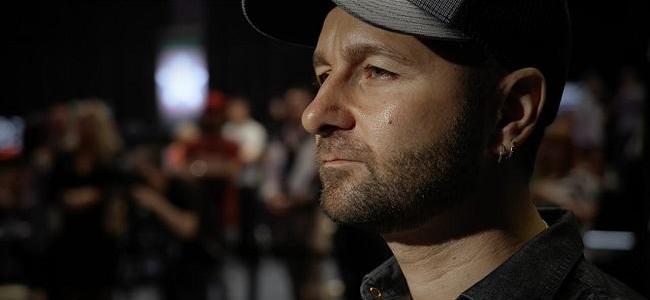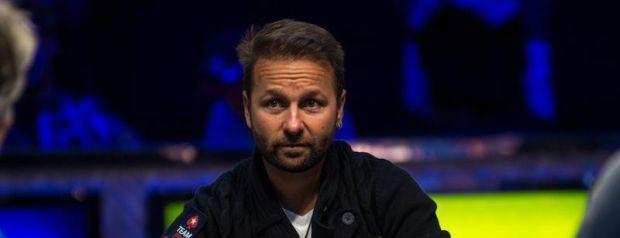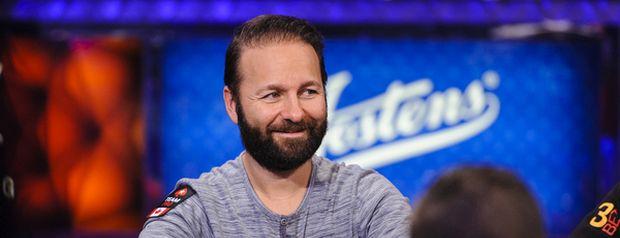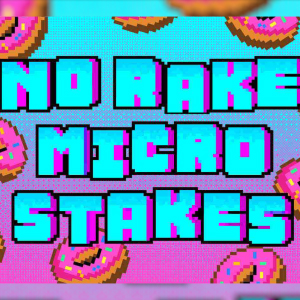KidPoker Documentary Review
9 years ago

08 Jun
When we did a piece on the release of KidPoker a few days ago, it left me excited to go sit down and watch the documentary. After all, Daniel Negreanu has an interesting origin story, and he is one of the few poker players who can come across as natural in front of the cameras.
There’s also a fair bit of drama in his past; with plenty of bad behaviour, rivalries, feuds, and general shenaniganising. He’s someone who is outspoken away from the table and a bit of a showboater too, but still manages to be charismatic and, in general, not entirely unlikeable.
In short he’s an ideal candidate for this sort of rags to riches to megabucks story.
The Setup
KidPoker tells Daniel Negreanu’s story starting from his middle-class origins in Toronto, through his school years, to him taking up poker, moving to Vegas, and next falling in with Jennifer Harman and Co. Then we get to see his his growing success and finally his move into being a sort of poker spokesman.
There is an attempt to frame the story around his induction speech into the Poker Hall of Fame at Binion’s, but that theme sort of disappears early and doesn’t resurface until ten minutes before the end.
Otherwise, the plot, as it were, is told in a straightforward manner, mostly by Daniel himself but also through interviews with family and other poker notables, including Phil Ivey, Jennifer Harman and a rather grovelling panegyric from Antonio Esfandiari.
Helmuth is notably absent, and no doubt is fuming somewhere about his lack of involvement in the film.
The Short Version
It really shouldn’t have taken much to make the documentary work, but with the exception of a few brief moments, I was bored by the whole thing.
As a piece of storytelling, it failed, skipping over the moments of conflict, failure, and drama as cursorily as its constant reassurance at each turn about a great guy Daniel really is, no matter what happens on the screen.
As a piece of journalism it fails too. I watched it with my ladyfriend whose interest in poker is limited to the occasional home game she is forced to take part in hosting. She came away saying she had learned nothing about poker or the poker world.
Which made sense as each time, and there are several, that Daniel decides to ‘relearn the game’ –buckling down to studying online play, or getting a book from the library– we get little more information than that. There is no real explanation of what the WSOP might be or mean, the Big Game is never mentioned except a quick reference to Daniel playing $2,000-$4,000 limits.
The obvious questions like: Why is he so good? and How was he different than every other player at the table? are not addressed. In the end, I came away knowing little more about Daniel than I knew from WPT player profiles and WSOP commentator banter.
Some of the weaknesses can be excused somewhat by the inexperience of the team. Francine Watson and Gary Davis do not have a world of documentary experience behind them and are both first time directors on this.
Which is not to say it is a disaster, as a documentary it is fairly solidly put together and largely competent, but at a level I might expect for a Channel 5 documentary not one on Netflix.
It is also shot well with the cinematography of a much slicker film, but as Mark Kermode says ‘beautifully shot’ is often code for dull, and in the end KidPoker just doesn’t do enough to justify its own existence.

Narrative Issues
In some ways, the problems are minor but they are pervasive.
Let's talk about the most significant aspect of the film: the storytelling. Look at how the piece is framed, opening on Daniel as he arrives at Binion’s in Vegas to accept his induction into the Poker Hall of Fame. Then we cut to an interview with Daniel where he talks about his childhood. The promise is that the story will be how he gets to the Hall of Fame, the way it will be told is through the speech.
Neither of those things comes true. In reality, the story is more about his development as a person than a poker player: more Mad Men than Rounders.
But the strange lack of payoff throughout the film is a long way from being the only problem. There is a persistent pattern which is best illustrated by an example.
Take the section that begins: ‘I had already started on a path of self-discovery and introspection when my agent Bryan did a course on emotional intelligence here in Vegas called Choice Centre.’ What follows is a talk about how this process helped him overcome some problems he had been having being ‘the best possible version of [him]self.’
If you can keep the sick down after all that, he goes on to explain that he had his heart broken and this was affecting his game. All we get about the relationship and the woman is that: ‘the signs were there’. Then we get a montage of the consequences: his game is off and there is sadness behind the smiley chat table image. Then we are reminded that Choice Centre fixed it all in the end, and he grew as a person.
Cut to next sequence.
This is almost the exact opposite of how a story should be told. First we shouldn't be told something went wrong: his game was off, show us that. Then tell us what happened: the relationship went awry (this is the heart of the drama, not a throwaway detail). After that we can find out about this thing that might help him: Choice Centre. And finally we get the resolution: he grows as a person.
The entire documentary is told like this. Solution, throwaway drama, consequences for poker, reminder of the solution. There is no tension, no detail, no sense of drama. It is a list of facts and it gets old really, really, really fast.
The Unkindest Cut
There is another persistent problem, this time with the way comedy is edited.
Throughout the film, the interviewees will throw out a pithy line, bon mot, or gag and the camera lingers on afterwards until they do something to deflate it: awkward smiles, muttered clarifications and – in Daniel’s case – laughing at his own jokes.
The result is awkward and decidedly unlikable. Everyone comes across badly and the entertainment of the piece is undercut.
If this were just a way of emphasising the reality of the film, avoiding something over-slick and overedited, then it might have been excusable. But there are two things that go against that: one is the occasional attempt at a visual gag through ‘clever’ cutting. The other is the montages in which PokerStars branded merchandise is viewed in close-up: being shuffled, bet, or otherwise pokered around in the most blatantly meretricious manner.
There are repeatedly clips which accidentally make Daniel look like an unmitigated douche. Clips of him needling people, making bad jokes, laughing at those jokes, getting all buddy-buddy with stone faced kids in hoods and glasses, and mocking people in rather personal ways.
And after all that, they have the moxy to cut to someone telling us, “He’s fun to watch, when he’s on TV you want to watch him.”
That is actually true, in real life. But it is not true of what the documentary shows us.

Why KidPoker?
In some ways the question that someone should have answered before production began is, why make a documentary about Daniel Negreanu at all?
The real answer, which we will come back to in a minute, is that PokerStars wanted the publicity, and Daniel is on their roster.
But pretend this is a legitimate piece of art and think about what documentaries telling the story of other major players might look like. Helmuth would be spouting the phony lines he’s clearly rehearsed but still can’t say naturally, while costumed as a billboard for whatever he is selling at the moment. Or imagine the dead-fish eyes of Tom Dwan. Ivey could work, but isn’t terribly talkative. Brunson could have worked his Texan charm, but might have died before the production could finish. Who is there now but Daniel that could pull it off? (Answers in the comments please).
It does make a certain kind of sense, but no one on the production team seems to have really thought about it. The story we get is leached of all real colour and personality.
In the end he just seems like a cardboard cutout jock: arrogant and smug. This illusion is amplified by the lack of anyone to counter the praise of the other interviewees. There isn't a single person who takes the anti-Daniel side.
He himself is blind to the possibility that even his teachers might not have liked him despite the framed letter saying what a pain of a student he was. The final portrait is of an arrogant hustler who has surrounded himself with yes men.
In other words, why didn’t they just make a documentary about Phil Helmuth? They’ve basically managed to turn Daniel into him. This is not what the documentary makers were going for and is not a terribly accurate a portrait of Daniel.
The whole thing is given a boring corporate sheen and, unfortunately, Daniel gets painted with the same brush.
A PokerStars Production
I remember watching a cheap sixty minute documentary on Stu Ungar years ago. I think it was on youtube if you want to hunt it up.
Editor: Found it!
It was thrown together rather cheaply and wasn’t much for artistry, but it was utterly compelling.
It was a story about a mathematical savant with an eidetic memory, who was hustling and gambling while basically still a child. He earned fabulous amounts of money and picked up a gambling problem, a cocaine problem, and two marriages along the way before a redemptive second chance at the WSOP and a tragic death soon after. It practically wrote itself. The parallels with Daniel are there, in fact, beat for beat Negreanu is basically a PG rated Ungar. They even used to call Stuey ‘The Kid’ too.
So it’s hard not to draw comparisons when a documentary tries to tell the story of a young poker player who grows from a troubled early success to be a giant of the game. Especially when they keep trying to pitch the emotional difficulties and the rebelliousness of the guy.
The difference is how that rebellion is rushed over. Even the poker doesn’t feature all that much in the foreground, and there is a reason for that: KidPoker is not about Daniel, it is about PokerStars. The documentary is actually an advert and they don’t want a Stu Ungar dirtying the laundry with his actual drama and genuine struggles. We want the illusion of rebellion but in the end nothing too sordid. Bad-boys are cool, but bad-behaviour is bad for the business. Unfortunately, good business doesn’t make for great viewing.
‘Play poker, it’s good clean fun’ is the message, but they want some sense of danger. After all, the appeal of gambling is its outsideriness. They try to have their cake and eat it too, but end up failing on both counts.






Comments
You need to be logged in to post a new comment